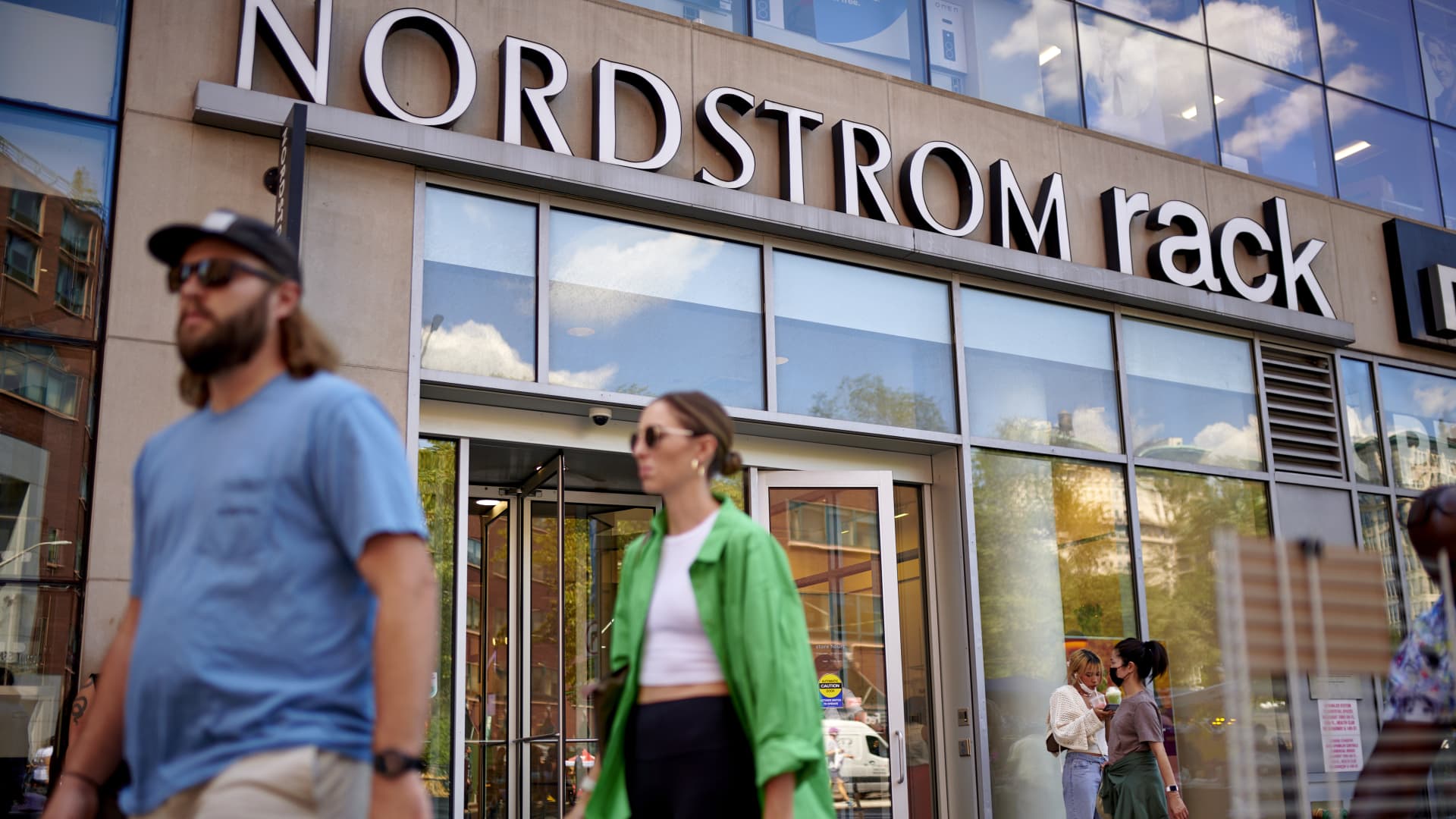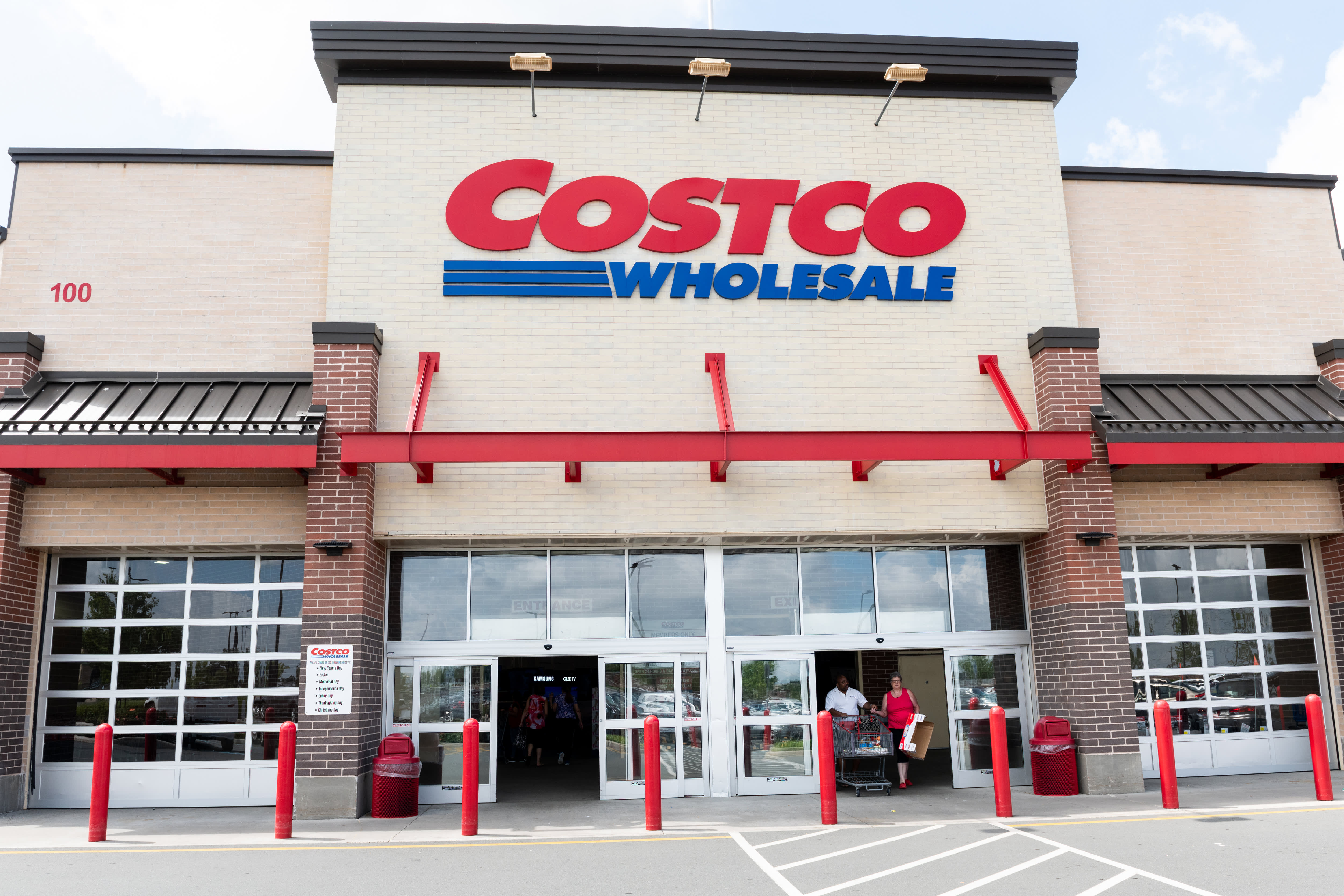Products You May Like
Shoppers are hungry for deals as they pay more for food and necessities. People are looking for clothes and accessories as they juggle parties, vacations and days at the office again.
But that has not helped Nordstrom‘s off-price chain, Nordstrom Rack. The brand remains a weak spot in the overall Nordstrom portfolio, with sales totaling $4.81 billion in the most recent fiscal year, below pre-pandemic levels. In the holiday quarter, Nordstrom Rack’s net sales dropped about 8%, underperforming the roughly 2% decline of the company’s namesake banner.
related investing news
Despite Rack’s struggles, the Seattle-based department store operator is betting it can turn the lagging chain into a growth driver. It plans to open 20 stores this year — with more coming after that.
Nordstrom Rack has formed a dedicated leadership team, which includes some off-price veterans. And it sharpened its focus on the well-liked brands that sell well.
The success or failure of the Nordstrom Rack turnaround effort could shape the company’s future. Nordstrom’s overall sales were stagnant even before the Covid pandemic. Now, discretionary merchandise is under pressure because of inflation, and higher costs for essentials have nudged consumers more toward off-price names. Those chains like T.J.Maxx, Ross Stores and Burlington Stores, have opened more stores and wooed new customers, driving higher foot traffic than Nordstrom Rack has seen.
Nordstrom, meanwhile, is bracing for a sales decline. It said in March that it expects revenue to fall by 4% to 6% this fiscal year compared with the prior one. That includes the effect of its recent decision to shutter its stores and online business in Canada.
Company leaders pinned slowing sales on Nordstrom-specific issues, as well as a tougher economy.
In an interview with CNBC, Chief Stores Officer Jamie Nordstrom said Rack locations got hit by inventory troubles during the pandemic. Shelves swung between having too many items and too few. And he added, too many items came from brands that fashion-forward customers didn’t recognize.
“If you went into a Nordstrom Rack, you saw a brand you’ve never heard of. That’s probably not something our customers are looking for,” he said. “If I went into a Rack store — and I’ve been working in this industry my entire life — if there’s a brand that I’ve never heard of, [it’s] probably not a great brand. That’s what we fixed.”
CEO Erik Nordstrom said shoppers have become more hesitant to spend, too. On a call with investors in March, he said the retailer saw shoppers pull back on spending in late June and through the holiday season. The trend was more pronounced at Rack and among lower-income customers than at the chain’s flagship stores.
He said a little over half of Rack’s sales decrease in the fiscal fourth quarter was driven by company actions to boost profits. Those include moves to eliminate store-based fulfillment of online orders and increase the minimum amount people must spend online to get free shipping.
In the company’s recent letter to shareholders, Erik Nordstrom acknowledged the company fell short in the past year. He said improving Nordstrom Rack’s sales is one of its top priorities.
Digital sales could give Rack an edge: Off-price players have been slower to move online, as they focus on the in-person treasure hunt.
But store traffic at Nordstrom Rack has lagged behind traditional off-price banners like Ross Dress for Less, Burlington, Marshalls and T.J. Maxx when compared to the year-ago period, according to monthly data from Placer.ai, which tracks retail foot traffic. In April, for example, store traffic was down nearly 16% year-over-year at Nordstrom Rack compared with approximately 3% growth at both T.J.Maxx and at Marshalls. Year-over-year store traffic in April declined about 7% at Ross and about 3% at Burlington.
Store traffic does not, however, capture how many items shoppers leave with — or how much they’re buying online at home.
Nordstrom’s struggles have attracted outside scrutiny. Activist investor Ryan Cohen, chairman of GameStop and founder of Chewy, bought a stake in the company earlier this year through his investment firm, RC Ventures. He has pushed for changes at the company as sales stagnate.
Cohen withdrew a proposal to nominate two candidates for Nordstrom’s board, but is keeping options open — including proposing board member changes again, according to a source familiar with the matter.
Cohen declined to comment. Nordstrom also declined to comment on the activist dispute, but said in a statement that the company “remains focused on executing its strategy and driving long-term profitable growth and value creation.”
In a tweet on Friday, Cohen referred to this article about Nordstrom Rack with a one-sentence reply: “Shareholders want cost cuts and no cronyism.”
Separately, the company recently added Eric Sprunk, former Nike COO, to its board. This week, it also named former Target executive Cathy Smith as its new chief financial officer.
Shares of Nordstrom reflect its lackluster performance. The stock has fallen about 6% so far this year, underperforming the 7% growth of the S&P 500 and 1% gain of the retail-focused XRT. Its stock closed at $15.13 on Thursday, roughly half of its 52-week high.
Nordstrom will offer updates about its turnaround strategy when it reports earnings on May 31.
‘Golden moment’ for off-price
Nordstrom Rack, a brand that caters to bargain-hunting fashionistas, was founded in 1973. As the department store retailer has closed some full-line stores, it has opened more of the off-price locations.
Nordstrom Rack stores outnumber the company’s namesake stores, with 241 locations across the country, according to company filings. But other off-price names have higher sales and a larger footprint.
Jamie Nordstrom said the Rack stores are the retailer’s “single largest vehicle for new customer acquisition.” Customers who are younger and with less disposable income often get introduced to Nordstrom through the lower-priced chain, then move to the pricier namesake store, Jamie Nordstrom said. He added that Nordstrom customers tend to shop both brands.
Nordstrom Rack stores accounted for more than 40% of new customers in 2022, CEO Erik Nordstrom said on the March earnings call.
The stores are also a way to move merchandise out of its full-line business, but still sell it in a profitable way, Jamie Nordstrom said. Rack also buys from brands’ closeout sales.
As it pins its growth hopes on the off-price locations, Nordstrom has turned Rack stores into e-commerce hubs, too. Customers can pick up and return online purchases at Rack locations, which tend to be closer and more convenient than mall stores.
Other department stores have also expanded into off-price. Names like Saks Off Fifth and Macy’s Backstage stores fit into the increased emphasis on lower-priced items.
Yet retailers face an inherent tension if they try to juggle both kinds of stores, said Simeon Siegel, a retail analyst from BMO Capital Markets. Off-price retailers make money by being opportunistic. They snap up eye-catching items from reputable brands eager to offload out-of-season or excess merchandise.
Retailers with full-priced businesses can fall into a trap of using the stores to park their own merchandise that hasn’t sold and that few people want, he said. That can hurt shoppers’ experience and merchants’ discipline.
“Off-price needs to have a maniacal focus on buying other people’s mistakes,” he said. “Not yours.”
Adrienne Yih, a retail analyst for Barclays, said Nordstrom Rack in the early years relied heavily on its department store merchandise. It doesn’t have the same muscle of longtime off-price players, which have teams that quickly snap up hot-ticket items.
She dubbed 2023 as off-price’s “golden moment” because many retailers and brands got stuck with a lot of extra inventory. Sophisticated buyers can get good merchandise for less.
“Knowing what to buy at what price can be more important in this environment,” Yih said.
Yih added that Rack doesn’t have the same breadth as off-price competitors, which have large categories like home goods and food. Plus, Nordstrom risks stealing sales away from its namesake business, she said.
Rack has a ‘long runway’
Jamie Nordstrom said a small percentage of Nordstrom Rack’s merchandise comes from its full-sized stores. He declined to specify further. Along with transferring from stores, it buys direct and closeout purchases from brands and carries some Nordstrom-made products.
But he and other Nordstrom leaders acknowledged that the Rack lost its way.
Jamie Nordstrom said the company has already taken steps to turn the off-price chain around. It’s zeroed in on merchandise that customers want, including higher-end brands that aren’t typically found at off-price competitors. It’s rolled out a new logo and refreshed its website.
Nordstrom Rack has also tapped some off-price veterans, including Nancy Mair, senior vice president of Rack merchandising, formerly of Burlington; and Kelly Wotton, vice president and divisional merchandise manager of Rack, previously of Macy’s Backstage and T.J.Maxx’s parent company TJX.
On the company’s website, Rack touts clothing, shoes, handbags and more from brands like Vince, Kate Spade and Ferragamo. Jamie Nordstrom said it must keep that fashion-forward approach sharp along with emphasizing value.
“Our customers are brand first, price second,” he said. “Where we went – with good intention – we went price first, brand second. And our customers did not respond to that.”
Sales performance is stronger at the company’s three newest Rack stores, Chief Brand Officer Pete Nordstrom told investors on the March call. He called that a “proof point” that when brands are hot and merchandise is fresh, shoppers respond.
As customers watch their budgets, Jamie Nordstrom said Rack is poised to benefit. He called the stretch after the Great Recession “the best run we’ve had in the modern history of our company.”
“We think that opportunity is right in front of us today,” he said.
He added that Nordstrom Rack’s footprint will grow. It has a tiny fraction of locations compared to TJX’s roughly 4,700 stores, Ross’ nearly 1,700 stores and Burlington’s approximately 900 stores.
“As we find great locations to open a Rack store, we’re going to be very interested,” he said. “We think there’s a long runway.”


